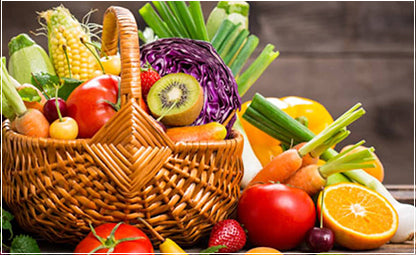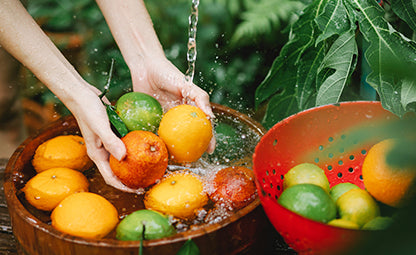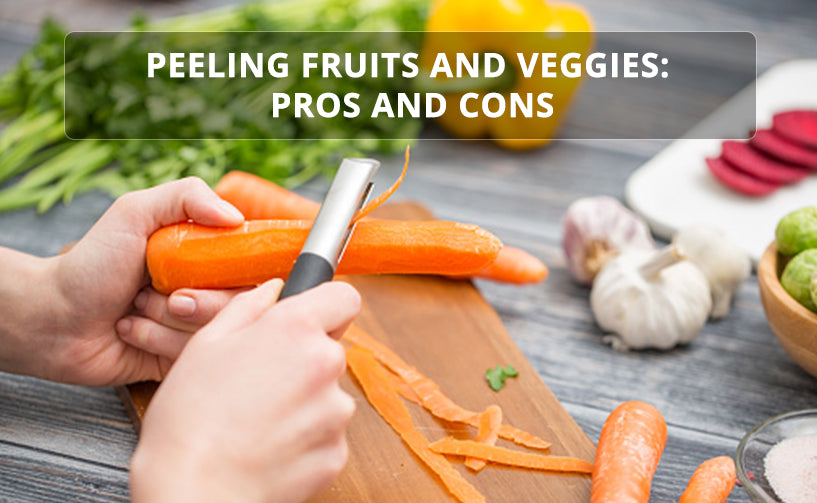We are all aware of the fact that eating more fruits and vegetables is good for our health. But the one thing that still remains unclear is whether it is better to consume these fruits and veggies with or without their skin. If you are someone wondering about this particular topic, then you are definitely at the right place. Read on to find out whether fruit and vegetables are best consumed peeled or unpeeled.

Whether it is due to mere habits or ways to eliminate exposure to pesticides, it has become a norm to discard the skins of the fruits and vegetables that we consume. However, what most people don’t realize is that when you remove the peels, you are also removing one of the most nutritious parts of the plant. That is why it is important to learn and better understand this particular topic so that we may get the right nutrients and reap the full benefits from the fruits and vegetables that we eat. For that, let us discuss some of the pros and cons of fruit and vegetable peels.
PROS:
- They are a storehouse of nutrients
It has been proven that unpeeled produce is much higher in nutrient content compared to peeled ones. That said, the nutrient content can vary based on the type of fruit or vegetable. Studies have demonstrated that fruits like a raw apple with skin and unpeeled boiled potato contain more vitamins and beneficial nutrients than peeled ones. Additionally, when it comes to peels, vegetable peels are also richer in fibre and health-benefiting antioxidants. Hence, consuming your fruits and veggies unpeeled can truly increase your nutrient intake.
Also Read: The Importance of Efficient Nutrient Absorption
- They may help prevent some diseases
Antioxidants from fruits and vegetables are known to be beneficial for reducing the risk of several diseases. And since fruit and vegetable peels are where antioxidants concentrate the most, this makes it clear that consuming unpeeled fruits and vegetables may be the solution to preventing free radical damage and ultimately reducing the risk of certain diseases like heart disease, Alzheimer’s disease and certain types of cancers.
- They can make you feel full for longer periods
Studies have shown that dietary fibre is what helps reduce hunger and makes us feel fuller longer. This is exactly what the peels of fruits and vegetables are great sources of. This makes them the ideal solution to healthy weight management. And besides this, studies have also shown that fibre also serves as food for the bacteria in our gut, which helps produce short-chain fatty acids that help in suppressing appetite and promote feelings of fullness.
Also Read: Foods To Keep You Hydrated During The Summer Heat
CONS:
- Some fruit or veggie peels are inedible or hard to clean
Every fruits and vegetable have different outer layers, which may be hard in texture or even inedible in some cases. Fruits like melons, avocado and pineapples have skins that are tough or rough in texture and are impossible or unpleasant to be eaten or digested. Likewise, some fruits and vegetables, despite being completely edible, may have a bitter unpleasant taste or may be coated with a waxy layer that can be particularly hard to clean. Hence, peeling or discarding tends to be the only option in these situations.
- They may contain pesticides or harmful chemicals
Pesticides are mainly used by farmers to help tackle crop damage and increase their yield. However, these pesticides are filled with chemicals that can be toxic to our health. That said, these pesticides tend to remain confined in the outer skin of the fruit or vegetable while some even enter the fruit or vegetable. Studies have shown that although washing can help remove the pesticide residues to a certain extent, peeling is more effective and helps remove up to twice as much when compared to just washing it. Hence, if you are someone concerned about pesticides on your fruits and veggies, it would be best to eat only the flesh of all fruits and vegetables by peeling them.

So now that you are familiar with the pros and cons of fruit and vegetable peels, you might be wondering which fruit and vegetable peels are edible and safe for consumption and which are not. Well, here are some of the common fruits and vegetables that should be peeled and which do not have to be.
Inedible peels include avocado, lemon, lime, orange, grapefruit, garlic, onion, pumpkin, melons, pineapple, papaya, litchi, dragon fruits, passion fruits, etc.
Edible peels include apple, berries, tomato, cherries, carrot, radish, cucumber, apricot or peaches, banana, brinjal or eggplant, grape kiwi, mushroom, potato, sweet potato, pear, pea, pepper, squash, zucchini, mango, etc.
Interesting facts: You may be wondering why banana is among the edible peels section. Well, this is because the peel of banana is especially rich in fibre and a great source of tryptophan, a compound that can help to increase your serotonin levels. It may taste unpleasant but it has been known that the peel tends to get thinner and sweeter as the fruit gets riper.
The same goes for kiwi and peaches. They may look fuzzy and unpleasant from the outside but fruits like kiwi, along with their fuzzy exterior, are completely edible. Eating the fruit along with the fuzzy skin is known to increase the fibre content up to three times. Moreover, it is also an excellent source of vitamin C, beneficial for health.
Conclusion
Peeling or removing the skins of the fruits and vegetables we eat has become a norm and habit for most of us. Unfortunately, what we failed to realize is that we are removing a great deal of beneficial nutrients in this process. Fruits and vegetable peels are where beneficial nutrients are mostly concentrated. They are high in fibre, vitamins, minerals and powerful antioxidants that are beneficial for our health and wellness. And although some peels may be tough, unpleasant-tasting or even hard to digest, most fruit and vegetable peels are completely edible and are best to not peel them whenever possible so that you can get the fullest of benefits from the fruits and vegetables that you eat.
You can visit Preserva Wellness for 100% plant-based daily health supplements that benefit all kinds of health needs and concerns.






